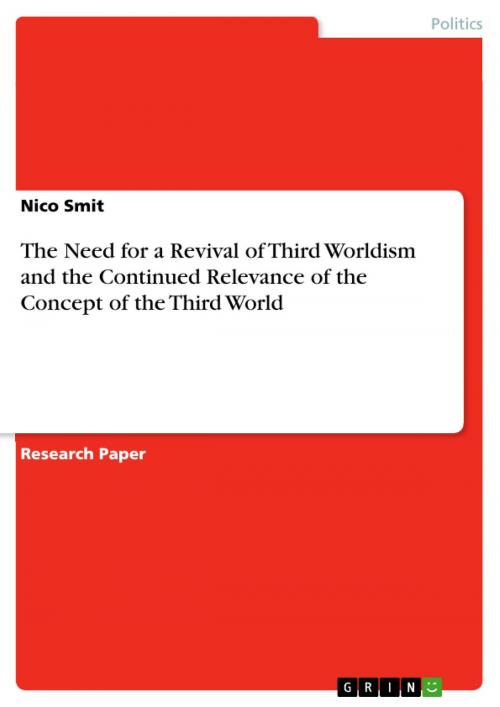The Need for a Revival of Third Worldism and the Continued Relevance of the Concept of the Third World
Nonfiction, Social & Cultural Studies, Social Science| Author: | Nico Smit | ISBN: | 9783640777860 |
| Publisher: | GRIN Publishing | Publication: | December 15, 2010 |
| Imprint: | GRIN Publishing | Language: | English |
| Author: | Nico Smit |
| ISBN: | 9783640777860 |
| Publisher: | GRIN Publishing |
| Publication: | December 15, 2010 |
| Imprint: | GRIN Publishing |
| Language: | English |
Research Paper (postgraduate) from the year 2010 in the subject Politics - International Politics - Topic: Development Politics, grade: 76%, University of Cape Town, course: International Relations Honours, language: English, abstract: The end of the Cold War, some have argued,1 has dealt the three worlds classification scheme a fatal blow and the break-up of the former Soviet Union and the associated disintegration of the Second World has to a large extent diminished the rationale which underlay the concept of the Third World.2 Furthermore, from its heyday in the 1970s, Third Worldism has been on a path of terminal decline due to a number of factors, such as disproportionate economic development among Third Worldist states,3 political differences and the failure to establish a 'common programme for international economic and political reform.'4 Within the literature relating to Third Worldism, the concept of the Third World itself, and the three worlds scheme, there is a lively debate with some arguing that the concept has become an anachronism,5 others maintaining that the concept maintains significance in the contemporary era. Furthermore, while there is general consensus within the literature that Third Worldism has experienced a declining trend, some argue that there is both the need and space for a revival of Third Worldism.6 == 1 Arif Dirlik, 'Spectres of the Third World' Global Modernity and the End of the Three Worlds,' Third World Quarterly 25 (2004): 131; Vicky Randall, 'Using and Abusing the Concept of the Third World: Geopolitics and the Comparative Political Study of Development and Underdevelopment,' Third World Quarterly 25 (2004): 43; Marc Williams, 'Re-Articulating the Third World Coalition: The Role of the Environmental Agenda,' Third World Quarterly 14 (1993): 7; Mark T. Berger, 'After the Third World? History, Destiny and the Fate of Third Worldism,' Third World Quarterly 25 (2004): 10. 2 Williams, 7. 3 Berger, After the Third World, 11. 4 Hans-Henrik Holm, 'The End of the Third World,' Journal of Peace Research 27 (1990): 2. 5 Dirlik, 131; Randall, 43; Williams, 7; Berger; After the Third World, 10. 6 Hee-Yeon Cho, 'Second Death, Or Revival of The 'Third World' in the Context of Neo-Liberal Globalization,' Inter-Asia Cultural Studies 6 (2004): 501-3; Kinhide Mushakoji,' Bandung Plus 50: A Call for Tri-Continental Dialogue on Global Hegemony,' Inter-Asia Cultural Studies 6 (2005): 514; Rajeev Patel and Philip McMichael, 'Third Worldism and the Lineages of Global Fascism: The Regrouping of the Global South in the Neoliberal Era,' Third World Quarterly 25 (2004): 241.
Research Paper (postgraduate) from the year 2010 in the subject Politics - International Politics - Topic: Development Politics, grade: 76%, University of Cape Town, course: International Relations Honours, language: English, abstract: The end of the Cold War, some have argued,1 has dealt the three worlds classification scheme a fatal blow and the break-up of the former Soviet Union and the associated disintegration of the Second World has to a large extent diminished the rationale which underlay the concept of the Third World.2 Furthermore, from its heyday in the 1970s, Third Worldism has been on a path of terminal decline due to a number of factors, such as disproportionate economic development among Third Worldist states,3 political differences and the failure to establish a 'common programme for international economic and political reform.'4 Within the literature relating to Third Worldism, the concept of the Third World itself, and the three worlds scheme, there is a lively debate with some arguing that the concept has become an anachronism,5 others maintaining that the concept maintains significance in the contemporary era. Furthermore, while there is general consensus within the literature that Third Worldism has experienced a declining trend, some argue that there is both the need and space for a revival of Third Worldism.6 == 1 Arif Dirlik, 'Spectres of the Third World' Global Modernity and the End of the Three Worlds,' Third World Quarterly 25 (2004): 131; Vicky Randall, 'Using and Abusing the Concept of the Third World: Geopolitics and the Comparative Political Study of Development and Underdevelopment,' Third World Quarterly 25 (2004): 43; Marc Williams, 'Re-Articulating the Third World Coalition: The Role of the Environmental Agenda,' Third World Quarterly 14 (1993): 7; Mark T. Berger, 'After the Third World? History, Destiny and the Fate of Third Worldism,' Third World Quarterly 25 (2004): 10. 2 Williams, 7. 3 Berger, After the Third World, 11. 4 Hans-Henrik Holm, 'The End of the Third World,' Journal of Peace Research 27 (1990): 2. 5 Dirlik, 131; Randall, 43; Williams, 7; Berger; After the Third World, 10. 6 Hee-Yeon Cho, 'Second Death, Or Revival of The 'Third World' in the Context of Neo-Liberal Globalization,' Inter-Asia Cultural Studies 6 (2004): 501-3; Kinhide Mushakoji,' Bandung Plus 50: A Call for Tri-Continental Dialogue on Global Hegemony,' Inter-Asia Cultural Studies 6 (2005): 514; Rajeev Patel and Philip McMichael, 'Third Worldism and the Lineages of Global Fascism: The Regrouping of the Global South in the Neoliberal Era,' Third World Quarterly 25 (2004): 241.















